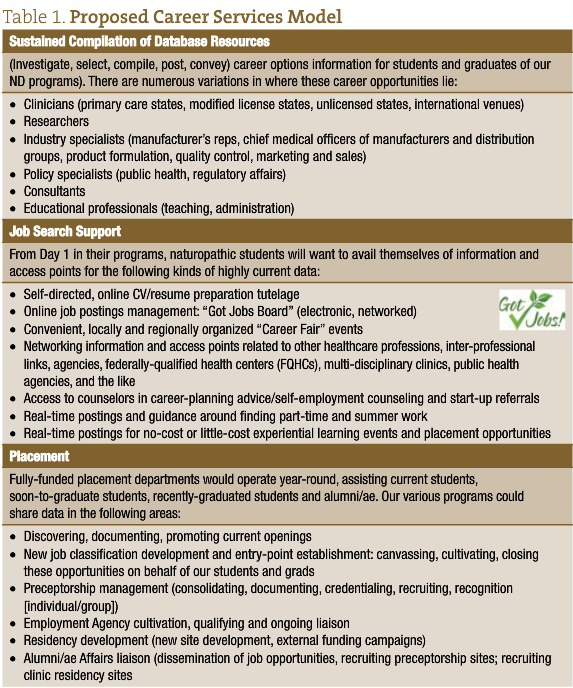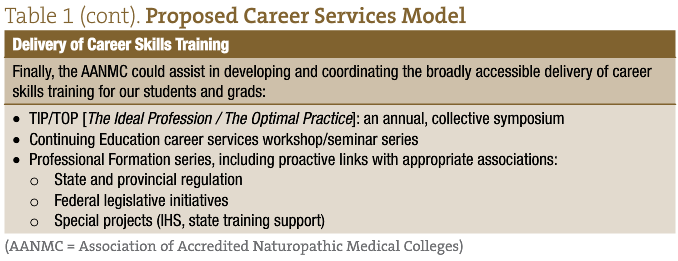David J. Schleich, PhD
My part in the discussion was to describe the growing presence of the natural medicine community in that Affordable Care Act (ACA) landscape. I was introduced as being part of the “naturopathic and integrative medicine” movement. To be sure, I quickly challenged that moniker, betraying my conviction that “integrative medicine” may be a big market chunk these days but that it was at the expense of genuine natural medicine professionals whose therapies and modalities were being hijacked willy-nilly by the dominant allopaths and their subordinate professions. However, the assembled teachers weren’t terribly interested in us after all, and pretty much yawned at my diatribe. After all, we represent about 0.004% of the aggregate MD/DO/advance practice nurse population of over a million. The participants were more interested in the speakers who addressed such topics as the growing concern about the dreaded “Match Day” when medical students get their sealed envelopes telling them where they are headed for their residency education. Several presenters also had half-empty-glass predictions about a continuing decline in residency slots for allopathic graduates, despite a likely growth in the number of medical students, and caps on Medicare reimbursements. Another presenter spoke about the growth in “employed” docs compared to independent clinicians and business operators, and why this spelled trouble for the medical profession. A community college career counselor spoke about how her students had experienced frequent impatience, and even bullying in hospital nursing internships by supervising teacher physicians and administrative nurses.A discernible malaise hung over a recent gathering of career counselors and guidance teachers from colleges and universities to which I was invited as a forum panel member. Their topic was “The Future of Healthcare Jobs in Post-ACA America.” The organizers of this undergraduate, mostly faculty advisor symposium began the event by declaring that many variables were affecting what was at one time a sure thing, that is that medical credentials at any level in the biomedicine industry, from the MD/DO, on down, were the ticket to a fulfilling and prosperous career. Get credentialed and what would follow were instant income and built-in social status.
Other topics raised during the forum included uncertainty voiced by an MD/PhD professor about the increased roles of nurse practitioners, advanced-practice registered nurses, and physician assistants. Her colleague, also an MD, spoke with alarm about the progressive, programmed cuts to Medicare funding in the next half-dozen years. One strident fellow from a regional health plan group declared that socialized medicine was wrecking the American healthcare market. By the end of the first day, I was feeling quite alone with my thoughts in the throng, but surprisingly buoyant. The kind of malaise I referenced earlier doesn’t spill over into our schools or grads. While the biomedicine cohorts were lamenting disruptions to market share, I know that we are very busy claiming beachhead.
Biomedicine Grads Awakening to Market Changes and Emerging Competition
Even though naturopathic medicine as a strong option for the students of these counselors, coordinators, chairs, and dean was not top-of-mind in the gathering, I did my best to talk about what real healthcare meant and why NDs and LAcs were a bigger part of the future than was apparent. Privately, I was reminded that our universe is more about finding an abiding, respected place in this complex, competitive, volatile healthcare landscape than about guarding dominant share and chunking out more at the expense of competitors. Our working universe has never been characterized by Matches, incentive packages for rural communities, or high-income employment opportunities in multi-disciplinary practices. One vendor at this employment symposium passed out beautifully-printed brochures accompanied by a free app measuring BMI, focused on opportunities in cosmetic medical spas. Another team of white-coated people distributed information sheets about busy urban practices in immediate need of nursing assistants, PAs, and NPs. Overall, very few of those with whom I spoke on that day took much heed of the value of our NDs in this “post-ACA, integrative medicine, post-CAM” universe. Even as the naturopathic medical community makes inroads, the laments about the uncertainties of what used to be the well-trodden, safe pathways of the allopathic professional’s future, felt overstated to me, given what our grads have faced for decades and still do. Even so, the future of those same ND grads feels friendlier and more optimistic than what their counselors are telling pre-med and pre-nursing students these days.
Driving back that night, I was more inclined than ever to strengthen our own efforts to create reliable paths of our own for our grads, given the exhausting nature of our programming, the high levels of debt, and the hijacking of our modalities by the burgeoning “integrative medicine” juggernaut of the biomedicine people who seem to be oblivious to their bulk in the healthcare china shop. Our students need – embedded and assured in their professional preparation – a recurrent, sustained, and proactive career preparation focus which demystifies where they can land once NPLEX is behind them.
Indeed, our students/grads will benefit more than ever in the second half of this second decade of a new century from sustained, flexible, internal and external support in curriculum (practice management, public policy, regulatory affairs), the generation and communication of employment opportunities, consistent key messages about career options along the continuum of recruitment/application/matriculation/degree completion/placement, and all of this within base budget-supported service department offerings of recurrent career services and resources.
Key Ingredients of Career Services for Our ND Graduates
Perhaps the Association of Accredited Naturopathic Medical Colleges (AANMC) could generate and share a career services model of interest to all our programs around North America. Such a model could embrace the following key functions: sustained compilation of database resources, job search support, placement, and delivery of job skills training (Table 1).
Such a model, once implemented and supported with sustained funding, could become an important priority of the AANMC, especially given the working environment into which our grads are propelled. Especially encouraging at the moment is that the biomedicine profession is increasingly aware of natural medicine professionals at the gates of the dominative US system in which orthodox medicine has long controlled all the gates and the turnstiles. One way to disrupt that monopoly is to give our grads a leg up in understanding the healthcare workplace and its very real, emerging opportunities.


 David J. Schleich, PhD, is president and CEO of NCNM, former president of Truestar Health, and former CEO and president of CCNM, where he served from 1996 to 2003. Previous posts have included appointments as vice president academic of Niagara College, and administrative and teaching positions at St. Lawrence College, Swinburne University (Australia) and the University of Alberta. His academic credentials have been earned from the University of Western Ontario (BA), the University of Alberta (MA), Queen’s University (BEd), and the University of Toronto (PhD).
David J. Schleich, PhD, is president and CEO of NCNM, former president of Truestar Health, and former CEO and president of CCNM, where he served from 1996 to 2003. Previous posts have included appointments as vice president academic of Niagara College, and administrative and teaching positions at St. Lawrence College, Swinburne University (Australia) and the University of Alberta. His academic credentials have been earned from the University of Western Ontario (BA), the University of Alberta (MA), Queen’s University (BEd), and the University of Toronto (PhD).


